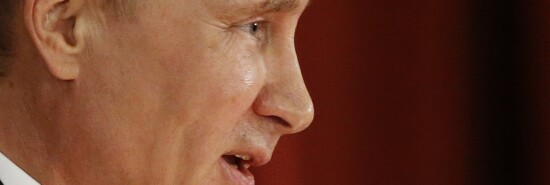
If Ukraine gives up land today, Russia will tomorrow
Michael Rubin
Video Embed
With U.S. support for Ukraine in its war against Russia slipping, Ukrainian President Volodymyr Zelensky will visit the White House on Tuesday as well as try to shore up flagging support in Congress. Sen. J.D. Vance (R-OH), one of the Senate’s most vocal critics of additional Ukraine aid, has explicitly called for Ukraine to compromise with Russia to achieve peace.
“What’s in America’s best interest is to accept Ukraine is going to have to cede some territory to the Russians, and we need to bring this war to a close,” he said on Sunday.
SHADOW OF DOUBT: ARE TRUMP CANDIDATES CHANGING THEIR ELECTION DENIAL TUNE HEADING INTO 2024?
Many opponents of greater Ukraine aid are sincere. Some fear Russian President Vladimir Putin would resort to nuclear war rather than accept defeat, while others do not believe Ukraine’s military is capable of breaking the current stalemate. Other defense intellectuals argue China poses a greater threat to the United States and incorrectly believe that support for Ukraine and Taiwan are mutually exclusive.
Put aside falsities about supposed Ukraine and Russia moral equivalence or naive hope that peace with Putin is even possible, especially if the world appeases aggression. To change Ukraine’s border in the face of Russian aggression would set a precedent by which the strong may always prey on the weak. Those seeking to appease Russia now should understand that transferring chunks of territory can be a two-way process. Rather than achieve peace, they may ignite a scramble for territory across Eurasia. Should the West impose the loss of Donbas and Crimea on Ukraine, Russia should expect far greater losses in the future.
Boris Yeltsin, Russia’s president from 1991 to 1999, was both weak and a drunk. He presided over a particularly chaotic period in Russian history that few Russians remember fondly. Still, his tenure was not all disaster. Recovery from a 70-year dictatorship was never going to be easy. Yeltsin had to build a democratic and political infrastructure from scratch. In this, he succeeded. Russia was far from perfect, but there was a balance of power and the system cultivated not only corrupt oligarchs, but also capable bureaucrats, politicians, and civil society.
Putin has since systematically dismantled any vestige of democracy. Like dictators before him, he preferred to work through a narrow group of loyalists and distrusted any bureaucracy that could reward competence and produce challengers. This, for example, was the reason why upon Saddam Hussein’s fall in Iraq, Sunni Arabs faced such a vacuum of leadership: the Kurds had their warlords and the Shiites had ayatollahs who could help organize them. Saddam, however, had spent more than a generation cutting off rivals at the knees so that Sunni Arabs were the group with the least governance capacity.
While Saddam’s fall led to internal chaos, so too will Putin’s. As soon as Putin dies, regional challengers will emerge, and peripheral power brokers will peel Russia apart. Aspiring successors might fill the vacuum in Moscow and St. Petersburg, but Vladivostok to Vladikavkaz might be a different story. Japan might recover its lost lands unilaterally, taking back southern Sakhalin and the Kuril Islands. China’s ambitions in Siberia are greater. While the collapse of the Soviet Union freed many Central Asian and Caucasian Soviet republics whose predecessors the Russian Empire conquered, many other entities fell within the borders of Russia itself. Entities such as Chechnya, Dagestan, and North Ossetia may seek independence if Russian power even temporarily evaporates.
European states might also revive claims. Russia stole Karelia, Salla, and Petsamo from Finland. Prussians ruled Konigsberg for centuries before Russian conquest and its transformation into Kaliningrad. Ukraine can and should claim Russian territory if nothing more than as reparations for decades of Russian aggression and murder.
Both Russians and those partial toward appeasing the Kremlin should beware: They may believe Russia can profit from its war in Ukraine, but they may instead be sowing the seeds for the end of the de facto empire that has existed under the guise of Russian statehood since the end of the 16th century. Putin may lament that the country he runs is 25% smaller than that ruled over by his Soviet predecessors, and he may dream of returning to Soviet borders. By reestablishing the fluidity of borders, however, he sets the stage for Russia’s contraction to its size during the reign of Feodor I.
CLICK HERE TO READ MORE FROM THE WASHINGTON EXAMINER
Michael Rubin (@mrubin1971) is a contributor to the Washington Examiner’s Beltway Confidential blog. He is a senior fellow at the American Enterprise Institute.
